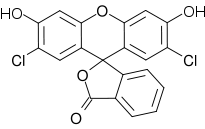Dichlorofluorescein
 | |
| Names | |
|---|---|
| IUPAC name
2',7'-dichloro-3',6'-dihydroxy-3H-spiro[2-benzofuran-1,9'-xanthen]-3-one | |
| Identifiers | |
| 76-54-0 | |
| ChEBI | CHEBI:51596 |
| ChEMBL | ChEMBL1908059 |
| ChemSpider | 58471 |
| Jmol interactive 3D | Image |
| PubChem | 64944 |
| |
| |
| Properties | |
| C20H10Cl2O5 | |
| Molar mass | 401.20 g·mol−1 |
| Except where otherwise noted, data are given for materials in their standard state (at 25 °C [77 °F], 100 kPa). | |
| | |
| Infobox references | |
Dichlorofluorescein (DCF) is an organic dye of the fluorescein family, being substituted at the 2 and 7 positions by chloride.
It is used as an indicator for argentometry by Fajans method.[1][2]
It is also used in the cellular antioxidant activity (CAA) assay. Dichlorofluorescin is a probe that is trapped within cells and is easily oxidized to fluorescent dichlorofluorescein. The method measures the ability of compounds to prevent the formation of DCF by 2,2'-Azobis(2-amidinopropane) dihydrochloride (ABAP)-generated peroxyl radicals in human hepatocarcinoma HepG2 cells.[3]
References
- ↑ Kolthoff, I. M.; Lauer, W. M.; Sunde, C. J. (1929). "The Use of Dichlorofluorescein as an Adsorption Indicator for the Argentometric Titration of Chlorides". Journal of the American Chemical Society 51 (11): 3273. doi:10.1021/ja01386a014.
- ↑ Bambach, Karl; Rider, T. H. (1935). "Volumetric Determinations of Halides: Use of Dichlorofluorescein as an Adsorption Indicator". Industrial & Engineering Chemistry Analytical Edition 7 (3): 165. doi:10.1021/ac50095a012.
- ↑ Wolfe, K. L.; Liu, R. H. (2007). "Cellular Antioxidant Activity (CAA) Assay for Assessing Antioxidants, Foods, and Dietary Supplements". Journal of Agricultural and Food Chemistry 55 (22): 8896–8907. doi:10.1021/jf0715166. PMID 17902627.
This article is issued from Wikipedia - version of the Saturday, August 29, 2015. The text is available under the Creative Commons Attribution/Share Alike but additional terms may apply for the media files.